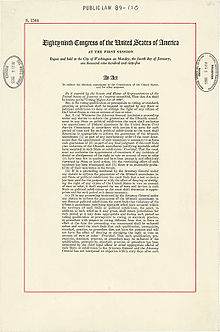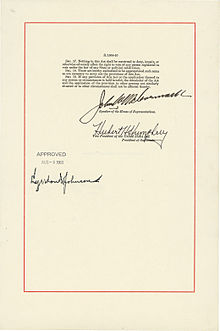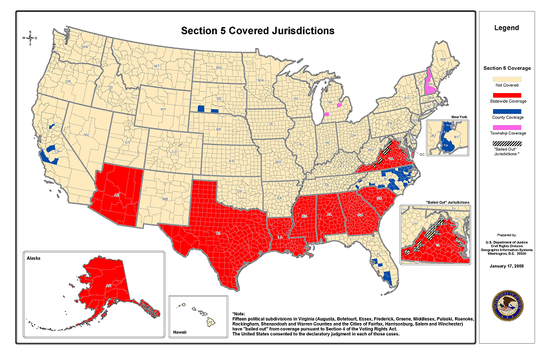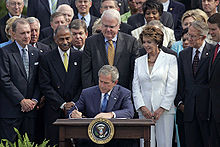- Voting Rights Act
-
Voting Rights Act of 1965 
Full title An act to enforce the fifteenth amendment to the Constitution of the United States, and for other purposes. Acronym VRA Colloquial name(s) Voting Rights Act Enacted by the 89th United States Congress Effective August 6, 1965 Citations Public Law 89-110 Codification Legislative history - Introduced in the Senate as S 1564 by Mike Mansfield (D–MT) and Everett Dirksen (R–IL) on March 18, 1965
- Committee consideration by: Judiciary
- Passed the Senate on May 26, 1965 (77-19)
- Passed the House with amendment on July 9, 1965 (333-85)
- Reported by the joint conference committee on July 29, 1965; agreed to by the House on August 3, 1965 (328-74) and by the Senate on August 4, 1965 (79-18)
- Signed into law by President Lyndon B. Johnson on August 6, 1965
Major amendments Renewed and Amended: 1970, 1975, 1982, 2006 Relevant Supreme Court cases South Carolina v. Katzenbach The Voting Rights Act of 1965 (42 U.S.C. §§ 1973–1973aa-6)[1] is a landmark piece of national legislation in the United States that outlawed discriminatory voting practices that had been responsible for the widespread disenfranchisement of African Americans in the U.S.[2]
Echoing the language of the 15th Amendment, the Act prohibits states from imposing any "voting qualification or prerequisite to voting, or standard, practice, or procedure ... to deny or abridge the right of any citizen of the United States to vote on account of race or color."[3] Specifically, Congress intended the Act to outlaw the practice of requiring otherwise qualified voters to pass literacy tests in order to register to vote, a principal means by which Southern states had prevented African-Americans from exercising the franchise.[2] The Act was signed into law by President Lyndon B. Johnson, a Democrat, who had earlier signed the landmark Civil Rights Act of 1964 into law.[2][4]
The Act established extensive federal oversight of elections administration, providing that states with a history of discriminatory voting practices (so-called "covered jurisdictions") could not implement any change affecting voting without first obtaining the approval of the Department of Justice, a process known as preclearance.[5] These enforcement provisions applied to states and political subdivisions (mostly in the South) that had used a "device" to limit voting and in which less than 50 percent of the population was registered to vote in 1964.[5] The Act has been renewed and amended by Congress four times, the most recent being a 25-year extension signed into law by President George W. Bush in 2006.[6]
The Act is widely considered a landmark in civil-rights legislation,[7] though some of its provisions have sparked political controversy. During the debate over the 2006 extension, some Republican members of Congress objected to renewing the preclearance requirement (the Act's primary enforcement provision), arguing that it represents an overreach of federal power and places unwarranted bureaucratic demands on Southern states that have long since abandoned the discriminatory practices the Act was meant to eradicate.[8] Conservative legislators also opposed requiring states with large Spanish-speaking populations to provide bilingual ballots.[9] Congress nonetheless voted to extend the Act for twenty-five years with its original enforcement provisions left intact.[10]
Contents
Background
Further information: Disfranchisement after the Civil WarThe 13th Amendment, ratified in 1865 after the Civil War, abolished and prohibited slavery and secured a minimal degree of citizenship to former slaves. The 14th Amendment, ratified in 1868, granted citizenship to all people “born or naturalized in the United States,” and included the due process and equal protection clauses. This amendment did not explicitly prohibit vote discrimination on racial grounds.
The 15th Amendment, ratified on February 3, 1870, provided that, "The right of U.S. citizens to vote shall not be denied or abridged by the United States or by any State on account of race, color, or previous condition of servitude.".[11] Additionally under the Amendment, the Congress was given the authority to enforce those rights and regulate the voting process. Soon after the end of Reconstruction, starting in the 1870s, Southern Democratic legislators found other means to deny the vote to blacks, through violence, intimidation, and Jim Crow laws. From 1890 to 1908, 10 Southern states wrote new constitutions with provisions that included literacy tests, poll taxes, and grandfather clauses that permitted otherwise disqualified voters whose grandfathers voted (thus allowing some white illiterates to vote), some with the aim and effect of re-imposing racially motivated restrictions on the voting process that disfranchised blacks. State provisions applied to all voters and were upheld by the Supreme Court in early litigation, from 1875 (United States v. Cruikshank) through 1904. During the early 20th century, the Supreme Court began to find such provisions unconstitutional in litigation of cases brought by African Americans and poor whites. States reacted rapidly in devising new legislation to continue disfranchisement of most blacks and many poor whites. Although there were numerous court cases brought to the Supreme Court, through the 1960s, Southern states effectively disfranchised most blacks.
In 1909, the National Association for the Advancement of Colored People (NAACP) was created with the mission to promote blacks' civil rights, including to "secure for them impartial suffrage." The NAACP's success was limited: although they did achieve important judicial rulings by the Supreme Court and some legislative successes, Southern legislators quickly devised alternate ways to keep many southern blacks disfranchised through the early 1960s.
Following the 1964 election, a variety of civil rights organizations banded together to push for the passage of legislation that would ensure black voting rights once and for all. The campaign to bring about federal intervention to prevent discrimination in voting culminated in the voting rights protests in Selma, Alabama, and the famous Selma to Montgomery marches. Demonstrations also brought out white violence, and Jimmie Lee Jackson, James Reeb, and Viola Liuzzo were murdered. President Lyndon B. Johnson, in a dramatic joint-session address, called upon Congress to enact a strong voting rights bill. Johnson's administration drafted a bill intended to enforce the 14th and 15th Amendments, aiming to eliminate various previously legal strategies to prevent blacks and other minorities from voting.
Legislative history
The Act was sent to Congress by President Johnson on March 17, 1965. The bill passed the Senate on May 26, 1965 (after a successful cloture vote on March 23), by a vote of seventy-seven to nineteen. The House was slower to give its approval. After five weeks of debate, it was finally passed on July 9. After differences between the two bills were resolved in conference, the House passed the Conference Report on August 3, the Senate on August 4. On August 6, President Johnson signed the Act into law with Martin Luther King, Jr., Rosa Parks, and other civil rights leaders in attendance.
Vote count
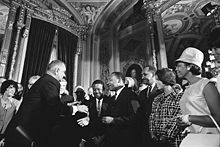 President Johnson, Martin Luther King, Jr. and Rosa Parks at the signing of the Voting Rights Act on August 6, 1965.
President Johnson, Martin Luther King, Jr. and Rosa Parks at the signing of the Voting Rights Act on August 6, 1965.
The two numbers in each line of this list refer to the number of representatives voting in favor and against the act, respectively.
Senate: 77–19
- Democrats: 47–17 (73%-27%)
- Republicans: 30–2 (94%-6%)
House: 333–85
- Democrats: 221–61 (78%-22%)
- Republicans: 112–24 (82%-18%)
Conference Report:
Senate: 79–18
- Democrats: 49–17 (four Southern Democrats voted in favor: Albert Gore, Sr., Ross Bass, George Smathers and Ralph Yarborough).
- Republicans: 30–1 (the lone nay was Strom Thurmond; John Tower who did not vote was paired as a nay vote with Eugene McCarthy who would have voted in favor.)
House: 328–74
- Democrats: 217–54
- Republicans: 111–20
Provisions
Section 2
Section 2 contains a general prohibition on voting discrimination, enforced through federal district court litigation. Congress amended this section in 1982, prohibiting any voting practice or procedure that has a discriminatory result. The 1982 amendment provided that proof of intentional discrimination is not required. The provision focused instead on whether the electoral processes are equally accessible to minority voters.[12] This section is permanent and does not require renewal.
On March 9, 2009, the U.S. Supreme Court ruled in Bartlett v. Strickland that the Voting Rights Act does not require governments to draw district lines favorable to minority candidates when the district has minorities as less than half of the population.[13]
Section 5 - Preclearance
Section 5 of the Act requires that the United States Department of Justice, through an administrative procedure, or a three-judge panel of the United States District Court for the District of Columbia, through a declaratory judgment action "preclear" any attempt to change “any voting qualification or prerequisite to voting, or standard, practice, or procedure with respect to voting..." in any "covered jurisdiction."[5] The Supreme Court gave a broad interpretation to the words "any voting qualification or prerequisite to voting" in Allen v. State Board of Election, 393 U.S. 544 (1969). A covered jurisdiction that seeks to obtain Section 5 Preclearance, either from the United States Attorney General or the United States District Court for the District of Columbia, must demonstrate that a proposed voting change does not have the purpose and will not have the effect of discriminating based on race or color. In some cases, they must also show that the proposed change does not have the purpose or effect of discriminating against a "language minority group." Membership in a language minority group includes "persons who are American Indian, Asian American, Alaskan Natives or of Spanish heritage." The burden of proof under current Section 5 jurisprudence is on the covered jurisdiction to establish that the proposed change does not have a retrogressive purpose.[14]
Covered jurisdictions may not implement voting changes without federal Preclearance. The Justice Department has 60 days to respond to a request for a voting change. If the Justice Department or federal court rejects a request for Preclearance, the jurisdiction may continue the prior voting practice or may adopt a substitute and seek Preclearance for it. If the jurisdiction implements a voting change before the Justice Department denies Preclearance in contravention of the Act, the jurisdiction must return to the pre-existing practice or enact a different change.
Those states which had less than 50 percent of the voting age population voting in 1960 and/or 1964 were covered in the original act. In addition, some counties and towns that have been found in violation of section 2 have been added. Some cities and counties in Virginia (see below) have since been found no longer to need Preclearance.
The United States Commission on Civil Rights recently reviewed the Justice Department Preclearance record and found that the percentage of DOJ objections to submitted changes has declined markedly throughout the 40-year period of the Act: from 5.5 percent in the first period to 1.2 percent in the second, and to 0.6 percent in the third. Over the last 10 years, the overall objection rate was so low as to be practically negligible, at less than 0.1 percent.[15] The Commission's two Democratic members dissented from the report, charging that the Commission had "abandon[ed] the field of battle."[16]
In the case Northwest Austin Municipal Utility District No. 1 v. Holder (2009), the Supreme Court ruled that the district should have greater capability of applying for exemption from this section.[17]
Bail out
The term "bail out" refers to the process by which covered jurisdictions may seek exemption from Section 5 coverage.[18] In order to bail out, a covered jurisdiction needs to obtain a declaratory judgment from the District Court for the District of Columbia.[5] Eighteen Virginia jurisdictions not covered by Section 5 Preclearance requirements have successfully "bailed out."[18]
Before August 1984, this process required covered jurisdictions to demonstrate that the voting test that they used immediately before coverage was not used in a discriminatory fashion. The 1982 amendment included two significant changes.[18] First, Congress provided that where a state is covered in its entirety, individual counties in that state may separately bail out. Second, Congress completely redesigned the bailout standard. The post-1984 bailout standard requires that a covered jurisdiction demonstrate nondiscriminatory behavior during the 10 years prior to filing and while the action is pending and that it has taken affirmative steps to improve minority voting opportunities.[18][19]
On September 22, 2010, the first two jurisdictions outside the state of Virginia - Kings Mountain, North Carolina, and Sandy Springs, Georgia - successfully "bailed out" from Section 5 Preclearance requirements.[20]
Jurisdictions requiring preclearance
The jurisdictions listed below must be precleared (see 28 C.F.R. part 51 appendix):[21]
States
- Alabama
- Alaska
- Arizona
- Georgia, except for the city of Sandy Springs
- Louisiana
- Mississippi
- South Carolina
- Texas
- Virginia, except for fourteen counties (Amherst, Augusta, Botetourt, Essex, Frederick, Greene, Middlesex, Page, Pulaski, Roanoke, Rockingham, Shenandoah, Washington and Warren) and four independent cities (Fairfax, Harrisonburg, Salem, and Winchester)
Counties
- California: Kings, Merced, Monterey, Yuba
- Florida: Collier, Hardee, Hendry, Hillsborough, Monroe
- New York: Bronx, Kings (Brooklyn), New York (Manhattan)
- North Carolina: Anson, Beaufort, Bertie, Bladen, Camden, Caswell, Chowan, Cleveland (except for the city of Kings Mountain), Craven, Cumberland, Edgecombe, Franklin, Gaston, Gates, Granville, Greene, Guilford, Halifax, Harnett, Hertford, Hoke, Jackson, Lee, Lenoir, Martin, Nash, Northampton, Onslow, Pasquotank, Perquimans, Person, Pitt, Robeson, Rockingham, Scotland, Union, Vance, Washington, Wayne, Wilson
- South Dakota: Shannon, Todd
Townships
- Michigan: Clyde Township (Allegan County), Buena Vista Township
- New Hampshire: Rindge, Millsfield, Pinkham's Grant, Stewartstown, Stratford, Benton, Antrim, Boscawen, Newington, Unity
Renewal
Some temporary sections of the Voting Rights Act (none involving the outlawing of poll taxes or literacy tests, which are permanently banned)[22] have been renewed four times and remain in force. These provisions were renewed in 1970, 1975, 1982, and 2006. In the 1982 action, Congress amended the Act to make some sections (including section 2) permanent while renewing the remainder (including section 5) for 25 years (until July 1, 2007).
In July 2006, 41 years after the Voting Rights Act passed, renewal of the temporary provisions enjoyed bi-partisan support. However, a number of Republican lawmakers acted to amend, delay or defeat renewal of the Act for various reasons. One group of lawmakers led by Georgia congressman Lynn Westmoreland came from some preclearance states, and claimed that it was no longer fair to target their states, given the passage of time since 1965 and the changes their states had made to provide fair elections and voting. Another group of 80 legislators supported an amendment offered by Steve King of Iowa, seeking to strip provisions from the Act that required that translators or multilingual ballots be provided for U.S. citizens who do not speak English.[9] The "King letter" said that providing ballots or interpreters in multiple languages is a costly, unfunded mandate.
The bill to renew the Act was passed by the U.S. House of Representatives on July 13 by a vote of 390-33, with support from Republican House leadership, led by Judiciary Committee Chairman F. James Sensenbrenner, Jr.. The U.S. Senate passed the bill 98–0 on July 20.[6] President George W. Bush signed the bill in a morning ceremony on the South Lawn of the White House on July 27, 2006, one year in advance of the 2007 expiration date.[6] This extension renewed the Act for another 25 years.[6] The audience included members of the families of slain civil rights leader Dr. Martin Luther King Jr. and Rosa Parks. Also in attendance were the Revs. Al Sharpton and Jesse Jackson, NAACP Chairman Julian Bond and other prominent African Americans.[6]
Criticisms
Preclearance
Some municipalities singled out in the Act for their practices in the 1960s, are still required by law to receive federal permission for certain changes to election law or changes in venue.[23] These nine Southern states and mostly Southern counties have complained that the practices banned by the Act disappeared long ago and further compliance with the mandates of the Act are a costly nuisance and an "unfair stigma" to their towns.[9] As an example of the federal bureaucracy involved, Georgia Rep. Jack Kingston said, "If you move a polling place from the Baptist church to the Methodist church, you've got to go through the Justice Department."[9]
Rep. Lynn Westmoreland, R-Ga., said:
“ Congress is declaring from on high that states with voting problems 40 years ago can simply never be forgiven, that Georgians must eternally wear the scarlet letter because of the actions of their grandparents and great-grandparents. ... We have repented and we have reformed."[24] ” Some who think that this federal oversight is discriminatory to these particular states have proposed that the oversight be extended to all 50 states or eliminated entirely.[25]
The 2006 extension of the preclearance procedure was challenged in a lawsuit, Northwest Austin Municipal Utility District No. 1 v. Holder, which was argued before the Supreme Court on April 30, 2009.[26] The lawsuit was brought by a municipal water district in Texas, which elects members to a water board. The district does not register voters, nor has it been accused of discrimination. However, it wished to move the voting location from a private home to a public school; the preclearance procedure required it to seek approval from the Justice Department, because Texas is a covered jurisdiction under Section 5.[27] While the Court did not declare preclearance unconstitutional, the decision redefined the law to allow any political subdivision covered by Section 5 to request exemption from federal review.[28]
During the 2010 election cycle, the state of Florida passed two redistricting amendments to their state constitution that were aimed at preventing future attempts at gerrymandering. Then-governor Charlie Crist, a supporter of both amendments, submitted a request to the DOJ for preclearance, as required by the VRA. In early 2011, Florida's newly-elected governor Rick Scott, a vocal opponent of these amendments, withdrew the request for preclearance, placing the legal status of the amendments in limbo.[29][30] In particular, only four of Floridas counties are required to obtain preclearance under the Act, making it unclear what the status of these amendments is in the remaining counties. Proponents of these amendments, both of which passed with greater than 60% voter approval, are accusing Scott's administration of attempting to "thwart the will of the voters", by "abusing their power", and the VRA's preclearance clause, as a means to defeat these amendments despite overwhelming voter support.[31]
Multilingual balloting
The Act requires municipalities that receive requests for ballots in other languages to comply with the request. Rep. Dana Rohrabacher (R-CA) of California said of the Act, "What unites us? It's our language, the English language," and that the Act is "hurting America by making it easier not to learn English."[24]
Gerrymandering
Some judges and proponents of racially drawn congressional districts have interpreted Section 5 of the Act as requiring racial gerrymandering in order to ensure minority representation.[32][33] The United States Supreme Court in Miller v. Johnson, 515 U.S. 900 (1995), overturned a 1992 Congressional redistricting plan which had created minority majority districts in Georgia as unconstitutional gerrymander. In Bush v. Vera, the Supreme Court, in a plurality opinion, rejected Texas's contention that Section 5 required racially-gerrymandered districts.
No affirmative right to vote
While the title of the Voting Rights Act might imply that it established an explicit right to vote for U.S. citizens to vote in presidential elections, there is no such federal right. In a Per curiam opinion regarding Bush v. Gore, 531 U.S. 98 (2000), the Supreme Court noted that, "The individual citizen has no federal constitutional right to vote for electors for the President of the United States," a logical conclusion given the history of the Electoral College.[34] However, the Voting Rights Act and three constitutional amendments that prevent discrimination in granting the franchise have established in Supreme Court jurisprudence that there is a "fundamental right" in the franchise, even though voting remains a state-granted privilege. However, states are given considerable leeway when it comes to this "fundamental right".
See also
References
- ^ "United States Department of Justice - Voting Rights Act of 1965". U.S. Department of Justice. 2006-03-20. http://www.usdoj.gov/crt/voting/misc/faq.htm. Retrieved 2008-08-29.
- ^ a b c "The Voting Rights Act of 1965". United States Department of Justice. http://www.justice.gov/crt/voting/intro/intro_b.php. Retrieved 2008-08-29.
- ^ "The Voting Rights Act of 1965". U.S. National Archives. http://www.ourdocuments.gov/doc.php?flash=true&doc=100&page=transcript. Retrieved 2008-08-29.
- ^ "Our Documents - Civil Rights Act (1964)". United States Department of Justice. http://www.ourdocuments.gov/doc.php?flash=old&doc=97. Retrieved 2010-07-28.
- ^ a b c d "About Section 5 of the Voting Rights Act". U.S. Department of Justice. http://www.justice.gov/crt/voting/sec_5/about.php. Retrieved 2010-07-28.
- ^ a b c d e "Bush signs Voting Rights Act extension: Historic 1965 law renewed for 25 years". Associated Press. 2006-07-21. http://www.msnbc.msn.com/id/14059113/. Retrieved 2008-08-29.
- ^ "Title VI of the Civil Rights Act of 1964". United States Department of Justice. http://www.justice.gov/crt/cor/coord/titlevi.php. Retrieved 2010-07-28.
- ^ Hulse, Carl (2006-06-22). "Rebellion Stalls Extension of Voting Rights Act". The New York Times. http://www.nytimes.com/2006/06/22/washington/22vote.html?scp=4&sq=voting+rights+act&st=nyt. Retrieved 2008-08-29.
- ^ a b c d Babington, Charles (2006-06-22). "GOP Rebellion Stops Voting Rights Act". Washington Post. http://www.washingtonpost.com/wp-dyn/content/article/2006/06/21/AR2006062101910.html. Retrieved 2008-08-29.
- ^ Hulse, Carl (2006-07-21). "By a Vote of 98-0, Senate Approves 25-year Extension of Voting Rights Act". The New York Times. http://query.nytimes.com/gst/fullpage.html?res=9B04E1DA173FF932A15754C0A9609C8B63&scp=7&sq=voting+rights+act&st=nyt. Retrieved 2008-08-29.
- ^ "The Constitution: Amendments 11-27". The National Archives. http://www.archives.gov/exhibits/charters/constitution_amendments_11-27.html. Retrieved 2010-07-28.
- ^ U.S. Commission on Civil Rights, "Voting Rights Enforcement and Reauthorization: The Department of Justice's Record of Enforcing the Temporary Voting Rights Act Provisions". May 2006. http://www.usccr.gov/pubs/051006VRAStatReport.pdf U.S. Commission on Civil Rights,. at 3
- ^ Barnes, Robert (2009-03-10). "Supreme Court Restricts Voting Rights Act's Scope". The Washington Post: p. A2. http://www.washingtonpost.com/wp-dyn/content/article/2009/03/09/AR2009030900987.html. Retrieved 2009-03-10.
- ^ U.S. Commission on Civil Rights, "Voting Rights Enforcement and Reauthorization: The Department of Justice's Record of Enforcing the Temporary Voting Rights Act Provisions". May 2006. http://www.usccr.gov/pubs/051006VRAStatReport.pdf U.S. Commission on Civil Rights,. at 6
- ^ U.S. Commission on Civil Rights, "Voting Rights Enforcement and Reauthorization: The Department of Justice's Record of Enforcing the Temporary Voting Rights Act Provisions" (PDF). May 2006. http://www.usccr.gov/pubs/051006VRAStatReport.pdf U.S. Commission on Civil Rights,. at 62
- ^ U.S. Commission on Civil Rights, "Voting Rights Enforcement and Reauthorization: The Department of Justice's Record of Enforcing the Temporary Voting Rights Act Provisions" (PDF). May 2006. http://www.usccr.gov/pubs/051006VRAStatReport.pdf U.S. Commission on Civil Rights,. at 91 (Commissioners Michael Yaki and Arlan Melendez, dissenting)
- ^ Stout, David (2009-06-23). "Justices Let Stand a Central Provision of Voting Rights Act". The New York Times. http://www.nytimes.com/2009/06/23/us/23scotus.html?hp. Retrieved 2009-06-22.
- ^ a b c d "Section 4 of the Voting Rights Act". U.S. Department of Justice. http://www.justice.gov/crt/about/vot/misc/sec_4.php. Retrieved 2011-07-05.
- ^ U.S. Commission on Civil Rights, "Voting Rights Enorcement and Reauthorization: An Examination of the Act's Section 5 Preclearance Provision". April 2006. http://www.usccr.gov/pubs/060706VRAbrief524.pdf U.S. Commission on Civil Rights,.at 44
- ^ http://www.justice.gov/opa/pr/2010/September/10-crt-1067.html
- ^ "Jurisdictions Covered Under Section 4(b) of the Voting Rights Act, as Amended". http://www.justice.gov/crt/about/vot/sec_5/covered.php.
- ^ "House Renews Voting Rights Act Provisions". San Francisco Chronicle. 2006-07-14. http://aad.english.ucsb.edu/docs/07-14-06fulbright.htm. Retrieved 2008-08-29.
- ^ Kellman, Laurie (2006-06-22). "Renewal of Voting Rights Act postponed". Boston Globe. http://www.boston.com/news/nation/washington/articles/2006/06/22/renewal_of_voting_rights_act_postponed/. Retrieved 2008-08-29.
- ^ a b "House Renews Voting Rights Act Unchanged". CBS News. Archived from the original on 2008-04-27. http://web.archive.org/web/20080427042841/http://www.cbsnews.com/stories/2006/07/14/ap/politics/mainD8IRNHO85.shtml. Retrieved 2008-08-29.
- ^ "Voting Rights Act". Court TV. 2007-11-21. Archived from the original on 2007-11-21. http://web.archive.org/web/20071121072336/http://www.courttv.com/ipoj/voting_act/voting-rights-act.html. Retrieved 2009-04-19.(archived from the original on 2007-11-21)
- ^ "AJC Article 30 April". Ajc.com. 2009-04-29. http://www.ajc.com/gwinnett/content/metro/stories/2009/04/29/supreme_court_voting_rights.html. Retrieved 2010-06-06.
- ^ Savage, David G. (2009-04-30). "LA Times Article 30 April". Latimes.com. http://www.latimes.com/news/nationworld/nation/la-na-court-civil-rights30-2009apr30,0,5360219.story. Retrieved 2010-06-06.
- ^ Bravin, Jess (June 23, 2009). "Supreme Court Avoids Voting-Rights Act Fight". Wall Street Journal. http://online.wsj.com/article/SB124567014181036773.html.
- ^ "Gov. Rick Scott Puts Hold on Redistricting Amendments". TheLedger.com. 2011-01-26. http://www.theledger.com/article/20110125/NEWS/101265036/1374?Title=Gov-Rick-Scott-Puts-Hold-on-Redistricting-Amendments. Retrieved 2011-01-26.
- ^ "Scott withdraws state request to have feds review redistricting amendment". The Miami Herald. 2011-01-25. http://miamiherald.typepad.com/nakedpolitics/2011/01/scott-withdraws-state-request-to-have-feds-review-redistricting-amendments.html. Retrieved 2011-01-26.
- ^ "Fair Districts Now: Scott, others ‘abuse power’ in attempt to squelch Amendments 5 and 6". The Florida Independent. 2011-01-25. http://floridaindependent.com/20118/fair-districts-now-rick-scott-others-abuse-power-in-attempt-to-squelch-amendments-5-and-6. Retrieved 2011-01-26.
- ^ "Faith, race and Barack Obama". The Economist. 2006-07-06. http://www.economist.com/displaystory.cfm?story_id=7141808.
- ^ "Article | Birth of a Gerrymander". Manhattan-institute.org. 2006-02-11. http://www.manhattan-institute.org/html/_ws-birth.htm. Retrieved 2010-06-06.
- ^ Per Curiam opinion regarding Bush v. Gore, Supreme Court of the United States, December 12, 2000.
Further reading
- Finley, Keith M. (2008). Delaying the Dream: Southern Senators and the Fight Against Civil Rights, 1938-1965. Baton Rouge: Louisiana State University Press. ISBN 9780807133453.
- Ansolabehere, Stephen; Persily, Nathaniel; Stewart, Charles III (2010). "Race, Region, and Vote Choice in the 2008 Election: Implications for the Future of the Voting Rights Act". Harvard Law Review 123 (6): 1385–1436. http://www.harvardlawreview.org/media/pdf/ansolabehere_persily_stewart.pdf.
External links
- "More information from the Leadership Conference on Civil Rights"
- U.S. Commission on Civil Rights, Voting Rights Enforcement and Reauthorization: An Examination of the Act's Section 5 Preclearance Provision
- 11 Worst Places to Vote an article from Mother Jones Magazine
- Voting Rights Act: Past, Present, and Future, by Justice Talking
- ”The Selma to Montgomery Voting Rights March: Shaking the Conscience of the Nation”, a National Park Service Teaching with Historic Places (TwHP) lesson plan
- United States Department of Justice Section 5 Covered Jurisdictions
Categories:- 1965 in law
- African American history
- Discrimination law in the United States
- History of voting rights in the United States
- United States congressional districts
- United States federal civil rights legislation
- United States federal election legislation
- Great Society programs
- Civil rights movement during the Lyndon B. Johnson Administration
Wikimedia Foundation. 2010.

